The global reconstituted meat market is valued at USD 6.9 billion in 2025 and is projected to reach USD 36.1 billion by 2035, registering a robust CAGR of 18% over the forecast period. This represents an absolute dollar opportunity of USD 29.2 billion, reflecting a 5.2x market expansion driven by rising demand for cost-effective protein solutions, ready-to-eat meals, and plant-based alternatives. Growth is being led by evolving consumer preferences toward convenience, affordability, and nutritional variety in meat-based and hybrid food products.
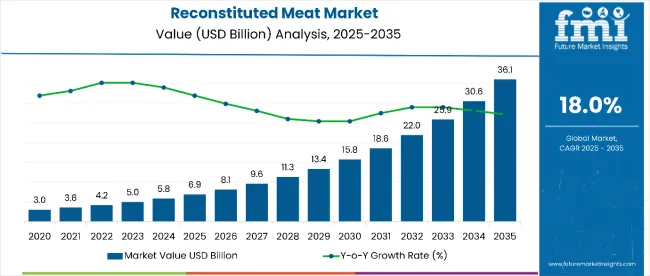
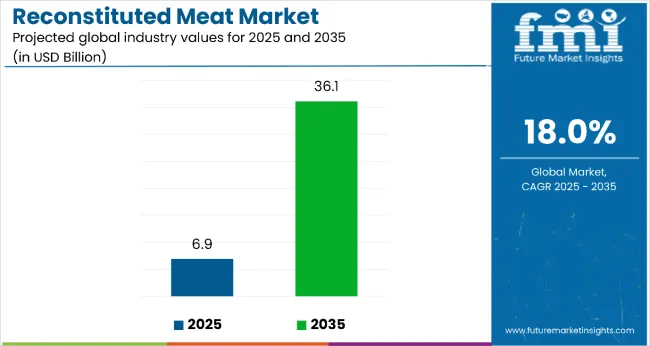
By 2030, the market is expected to reach USD 16.5 billion, contributing USD 9.6 billion in incremental value during the first half of the decade. The remaining USD 19.6 billion is forecasted for the second half, indicating a back-loaded growth trajectory. Technological advancements in reconstitution processes are improving product texture, flavor, and shelf life, increasing parity with whole meat and expanding appeal across multiple consumer segments.
Key players such as Tyson Foods and JBS S.A. are investing in clean-label formulations and plant-forward innovation to strengthen market positioning and meet rising health and sustainability demands. Regulatory reforms and heightened focus on transparency are influencing new product development strategies and driving cross-border collaboration. Market competitiveness will increasingly depend on functional enhancements, clean-label compliance, and hybrid meat innovation.
The reconstituted meat market accounts for 42% of the processed meat segment, anchored in its cost efficiency, supply consistency, and adaptability in high-volume products such as deli slices, sausages, and meat snacks. It comprises 36% of the global convenience meals category, supported by rapid integration into ready meals and frozen entrees. The market contributes 28% to the hybrid meat alternatives segment as manufacturers blend traditional and plant-based ingredients to target flexitarian consumers. Reconstituted meat also holds a 22% share in the foodservice supply chain and approximately 18% in the organic and clean-label meat category.
Structural transformation is underway as demand for affordable and functional protein accelerates across urban and price-sensitive demographics. Emerging processing innovations are improving binding quality, mouthfeel, and stability, making reconstituted meat more competitive with whole cuts. Strategic investments in e-commerce, private labeling, and clean-label R&D are reshaping distribution models and opening access to newer consumer bases. Evolving food labeling regulations and increasing attention to ingredient transparency are encouraging traditional meat producers to reposition offerings toward health-conscious, sustainable solutions.
Lower production costs, consistent quality, and versatility in products such as nuggets, sausages, and deli meats make reconstituted meat an attractive option for manufacturers and foodservice providers.
Rising demand for convenience foods, growing interest in plant-based and hybrid meat options, and technological improvements in texture, flavor, and shelf life are driving adoption. Supportive government initiatives and expanding retail and quick-service restaurant networks are further boosting market growth.
In emerging economies, rising disposable incomes and urbanization are increasing demand for affordable protein options, while in mature markets, innovation in health-focused and clean-label products is attracting new consumers. With producers focusing on diversification and better nutritional profiles, the market is well-positioned for continued expansion across multiple food categories.
The market segments include nature and product type, as well as application and region. The nature segment includes organic and conventional. The product type segment covers pork, beef, lamb & mutton, chicken, turkey, and others (e.g. goat, game, exotic meats). The application segment includes food industry readytoeat (RTE) products, canned products, meat snacks, pet food, and HoReCa/foodservice operators. The regional segment comprises North America, Europe, Asia Pacific, Latin America, and Middle East & Africa.
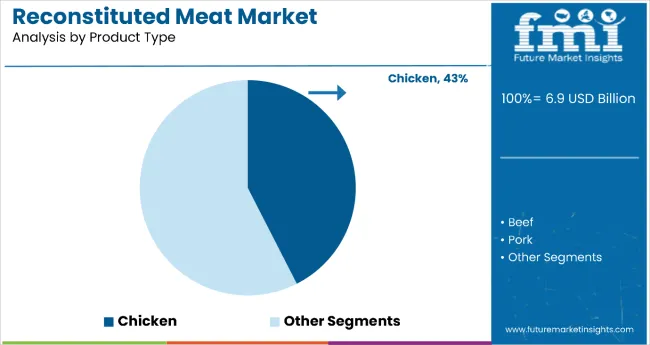
The chicken-based reconstituted meat segment is projected to hold a 43% share of the global reconstituted meat market in 2025, positioning it as one of the leading product type categories by value. Chicken's broad consumer appeal is attributed to its mild flavor, versatility, and reputation as a lean, healthy protein.
It finds application in diverse formats such as nuggets, patties, deli slices, canned goods, and shredded meat. High production efficiency, competitive pricing, and strong presence in both retail and foodservice channels contribute to consistent demand. Rapid growth in emerging economies, particularly in Asia-Pacific, is supported by chicken’s affordability and adaptability in regional cuisines. With ongoing improvements in reconstitution technologies enhancing taste, texture, and shelf life, chicken is expected to retain its leading market role through 2035.
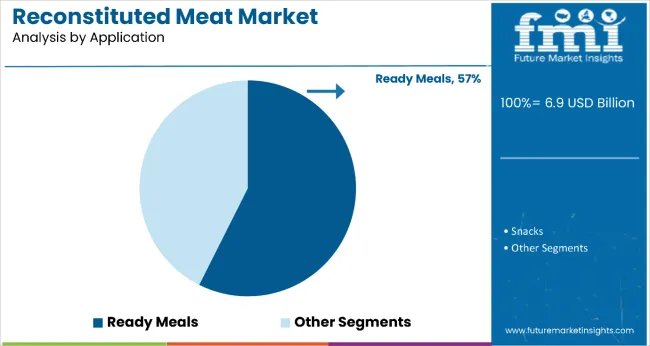
The ready-to-eat products segment is forecasted to dominate with a 57% share of the global reconstituted meat market in 2025, driven by rising demand for convenient, pre-packaged meals suited to busy urban lifestyles. The segment includes frozen, chilled, and shelf-stable meal kits featuring reconstituted meat in curries, pasta dishes, rice bowls, and multi-component trays.
Distribution is supported by retail chains, convenience stores, and online platforms, while innovations in packaging and preservation extend shelf life with minimal quality loss. The segment is also evolving with premium offerings, health-forward options, and plant-meat hybrids gaining momentum, especially in developed regions. Given its alignment with evolving consumption patterns, ready meals are projected to maintain their leadership in application share over the long term.
In 2024, the reconstituted meat market witnessed steady demand growth, driven by increasing consumption of processed and convenience foods such as nuggets, sausages, deli meats, and ready-to-eat meals. Key drivers include cost-effective production, efficient use of meat trimmings, and strong demand from fast food chains and urban households. Advancements in processing technologies have improved taste, texture, and shelf life, making reconstituted meat competitive with whole meat options. These factors are accelerating adoption across retail, QSR, and institutional catering sectors.
Key Drivers Fueling Reconstituted Meat Market Expansion
The primary growth driver is the rising preference for affordable, protein-rich, and convenient food solutions in both developed and emerging markets. Reconstituted meat allows manufacturers to optimize meat utilization while delivering products at competitive pricing. Widespread integration in ready-to-cook and ready-to-eat formats supports consumer convenience. Technological improvements in binding agents, emulsification, and curing techniques are enhancing product quality. Rapid urbanization, busy lifestyles, and growing frozen food consumption are further propelling category expansion globally.
Major Restraints Challenging Reconstituted Meat Market Development
Despite its affordability and functional appeal, the market faces headwinds from health-related concerns. Processed meats face scrutiny due to associations with high sodium levels, preservatives, and ingredients like transglutaminase. These raise consumer skepticism, especially in health-conscious markets. Regulatory bodies in Europe and North America have issued warnings about potential health risks, including links to chronic illnesses. This has resulted in slowing demand in some regions and has increased compliance costs for manufacturers seeking clean-label positioning.
Emerging Key Trends Influencing Reconstituted Meat Market Direction
Emerging trends include the rapid development of plant-based reconstituted meat alternatives aimed at replicating traditional meat experiences with sustainable, allergen-free ingredients. Companies are investing in hybrid formulations and nutrient-fortified reconstituted meats tailored to wellness-conscious consumers. Ready-to-eat product integration continues to grow, with strong placement in frozen meals, sandwiches, and snacking kits. Packaging innovations and extended shelf life solutions are supporting market reach, while ethical sourcing and clean-label trends are driving product reformulation in response to consumer transparency demands.
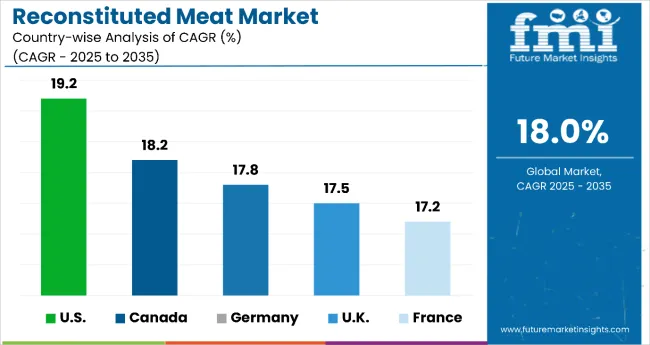
The USA is set to lead growth in the reconstituted meat market with a CAGR of 19.2% from 2025 to 2035, driven by large-scale automated processing and strong export pipelines. Canada follows closely with an 18.2% CAGR, supported by provincial incentives, advanced texturization technology, and deep integration with USA supply chains. Germany’s projected 17.8% CAGR reflects its push for allergen-free, hybrid formulations and modernized EU-compliant facilities. The UK, at a 17.5% CAGR, is focusing on cost-efficient hybrid protein solutions, innovative retail snack formats, and Middle Eastern export growth. France, growing at a 17.2% CAGR, is strengthening its pork and poultry specialization, expanding automation, and increasing exports to francophone Africa.
The report covers an in depth analysis of 40+ countries; five top performing OECD countries are highlighted below.
The USA reconstituted meat revenue is anticipated to grow at a CAGR of 19.2% from 2025 to 2035, the highest among major economies. Growth will be driven by the expansion of large-scale automated processing facilities in Texas and Iowa, alongside rising demand for hybrid meat-protein products in both retail and foodservice sectors. Automated production lines are scaling rapidly, integrating soy-protein blends to reduce costs without compromising quality.
Sales of reconstituted meat in Canada are projected to grow at a CAGR of 18.2% between 2025 and 2035, driven by scaling production in Ontario and Alberta to meet rising domestic and export demand. Government-backed agri-food clusters are modernizing texturization technology, enabling higher output of poultry- and beef-based reconstituted products for North American markets. Provincial incentives are fueling processing facility expansion, while the ready-to-eat and frozen product categories continue to gain traction.
Sales of reconstituted meat market in Germany is forecasted to grow at a CAGR of 17.8% between 2025 and 2035, supported by investments in allergen-free, low-fat, and plant-meat hybrid production lines. Modernized processing hubs in Lower Saxony and Bavaria are enhancing efficiency and capacity to meet both domestic demand and export opportunities within the EU. The market is benefiting from harmonized European regulations that facilitate cross-border distribution, while premium product positioning alongside organic processed meats is attracting health-conscious consumers.
The reconstituted meat revenue in the UK is forecasted to grow at a CAGR of 17.5% between 2025 and 2035, supported by processing capacity expansion in Yorkshire and the Midlands to meet rising demand for affordable protein sources. Hybrid meat formulations and retail-ready snack products are driving product innovation, while exports to the Middle East are becoming a key growth avenue.
Sales of reconstituted meat in France are expected to grow at a CAGR of 17.2% between 2025 and 2035, driven by scaling production in Brittany and Nouvelle-Aquitaine, supported by automation and the development of specialty products. Rising exports to francophone African markets are being fueled by competitive pricing and the popularity of processed poultry products.
The reconstituted meat market is highly fragmented, combining multinational meat processors, regional suppliers, and hybrid protein innovators. Tyson Foods and Cargill dominate the large-scale production segment, delivering reconstituted beef, poultry, and pork to retail and foodservice channels worldwide. Their competitive advantage lies in advanced texturization technology, HACCP-certified facilities, and robust supply chain integration that ensures consistent quality across markets.
JBS and Marfrig operate on a high-volume, export-oriented model, supplying bulk reconstituted meat products to global quick-service restaurant chains and institutional buyers. Their vertically integrated livestock operations, combined with capacity for customized formulations, allow them to adapt quickly to varying market demands.
In Europe, Vion Food Group and Danish Crown have built strong positions in pork-based and hybrid protein products, distributing across the EU’s harmonized regulatory framework. Their focus on allergen-free, low-fat, and premium reconstituted offerings supports growing demand among health-conscious and convenience-oriented consumers. In North America, Maple Leaf Foods and Olymel stand out for their innovation in plant-meat hybrid formulations, targeting sustainability-conscious buyers and tapping into the expanding flexitarian consumer base.
| Report Attributes | Details |
|---|---|
| Quantitative Units | USD 6.9 billion |
| By Nature | Organic and Conventional |
| By Product Type | Pork, Beef, Lamb and Mutton, Chicken, Turkey, Others (Goat, Duck, Game Meat) |
| By Application | Food Industry, RTE Products, Canned Products, Meat Snacks, Pet Food, HoReCa /Foodservice Operators, Others (Institutional Catering, Meal Kits) |
| Regions Covered | North America, Latin America, Western Europe, Eastern Europe, East Asia, South Asia Pacific, Middle East & Africa |
| Countries Covered | United States, Canada, United Kingdom, Germany, France, China, Japan, South Korea, Brazil, Australia , and 40+ countries |
| Key Players | Givaudan , International Flavors & Fragrances, TerraVia Holdings Inc., Land O’ Lakes, Amul , Kerry Gold, Lorran , Golden Barrel, Carrington Farms, Mane, Thrive Flavoring , Bioprocess Flavorings |
| Additional Attributes | Dollar sales by value, market share by country and region, production capacity trends, competitive landscape |
The global reconstituted meat market is estimated to be valued at USD 6.9 billion in 2025.
The market size for the reconstituted meat market is projected to reach USD 36.1 billion by 2035.
The reconstituted meat market is expected to grow at a 18.0% CAGR between 2025 and 2035.
The key product types in reconstituted meat market are organic and conventional.
In terms of product type, pork segment to command 48.6% share in the reconstituted meat market in 2025.






Our Research Products

The "Full Research Suite" delivers actionable market intel, deep dives on markets or technologies, so clients act faster, cut risk, and unlock growth.

The Leaderboard benchmarks and ranks top vendors, classifying them as Established Leaders, Leading Challengers, or Disruptors & Challengers.

Locates where complements amplify value and substitutes erode it, forecasting net impact by horizon

We deliver granular, decision-grade intel: market sizing, 5-year forecasts, pricing, adoption, usage, revenue, and operational KPIs—plus competitor tracking, regulation, and value chains—across 60 countries broadly.

Spot the shifts before they hit your P&L. We track inflection points, adoption curves, pricing moves, and ecosystem plays to show where demand is heading, why it is changing, and what to do next across high-growth markets and disruptive tech

Real-time reads of user behavior. We track shifting priorities, perceptions of today’s and next-gen services, and provider experience, then pace how fast tech moves from trial to adoption, blending buyer, consumer, and channel inputs with social signals (#WhySwitch, #UX).

Partner with our analyst team to build a custom report designed around your business priorities. From analysing market trends to assessing competitors or crafting bespoke datasets, we tailor insights to your needs.
Supplier Intelligence
Discovery & Profiling
Capacity & Footprint
Performance & Risk
Compliance & Governance
Commercial Readiness
Who Supplies Whom
Scorecards & Shortlists
Playbooks & Docs
Category Intelligence
Definition & Scope
Demand & Use Cases
Cost Drivers
Market Structure
Supply Chain Map
Trade & Policy
Operating Norms
Deliverables
Buyer Intelligence
Account Basics
Spend & Scope
Procurement Model
Vendor Requirements
Terms & Policies
Entry Strategy
Pain Points & Triggers
Outputs
Pricing Analysis
Benchmarks
Trends
Should-Cost
Indexation
Landed Cost
Commercial Terms
Deliverables
Brand Analysis
Positioning & Value Prop
Share & Presence
Customer Evidence
Go-to-Market
Digital & Reputation
Compliance & Trust
KPIs & Gaps
Outputs
Full Research Suite comprises of:
Market outlook & trends analysis
Interviews & case studies
Strategic recommendations
Vendor profiles & capabilities analysis
5-year forecasts
8 regions and 60+ country-level data splits
Market segment data splits
12 months of continuous data updates
DELIVERED AS:
PDF EXCEL ONLINE
Reconstituted Milk Market Size and Share Forecast Outlook 2025 to 2035
Reconstituted Juice Market Size and Share Forecast Outlook 2025 to 2035
Reconstituted Wood Market Size and Share Forecast Outlook 2025 to 2035
Meat Snacks Market Size and Share Forecast Outlook 2025 to 2035
Meat Alternative Market Forecast and Outlook 2025 to 2035
Meat, Poultry, and Seafood Packaging Market Size and Share Forecast Outlook 2025 to 2035
Meat Extracts Market Size and Share Forecast Outlook 2025 to 2035
Meat Trays Market Analysis - Size and Share Forecast Outlook 2025 to 2035
Meat Interleaving Paper Market Size and Share Forecast Outlook 2025 to 2035
Meat Enzyme Market Analysis - Size and Share Forecast Outlook 2025 to 2035
Meat Mixers Market Size and Share Forecast Outlook 2025 to 2035
Meat Stabilizer Market Size and Share Forecast Outlook 2025 to 2035
Meat Processing Equipment Market Size and Share Forecast Outlook 2025 to 2035
Meat Cutting Machine Market Size and Share Forecast Outlook 2025 to 2035
Meat Mincers Market Size and Share Forecast Outlook 2025 to 2035
Meat Tenderizer Market Size and Share Forecast Outlook 2025 to 2035
Meat Starter Cultures Market Size and Share Forecast Outlook 2025 to 2035
Meat Based FPP Market Size and Share Forecast Outlook 2025 to 2035
Meat Dicing Machine Market Size and Share Forecast Outlook 2025 to 2035
Meat Seasonings Market Size and Share Forecast Outlook 2025 to 2035

Thank you!
You will receive an email from our Business Development Manager. Please be sure to check your SPAM/JUNK folder too.
Chat With
MaRIA